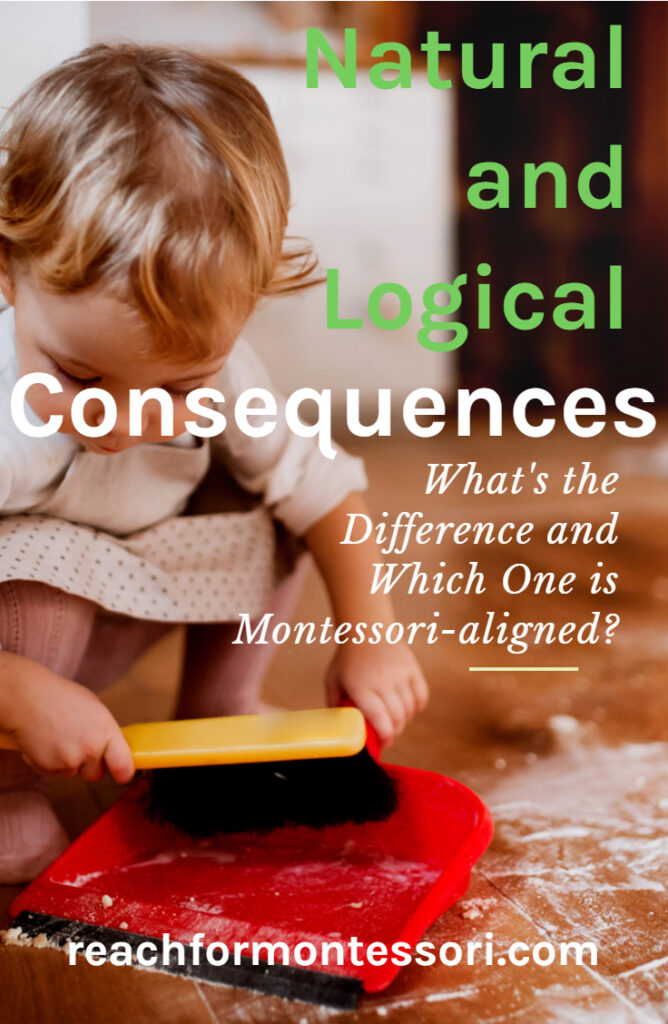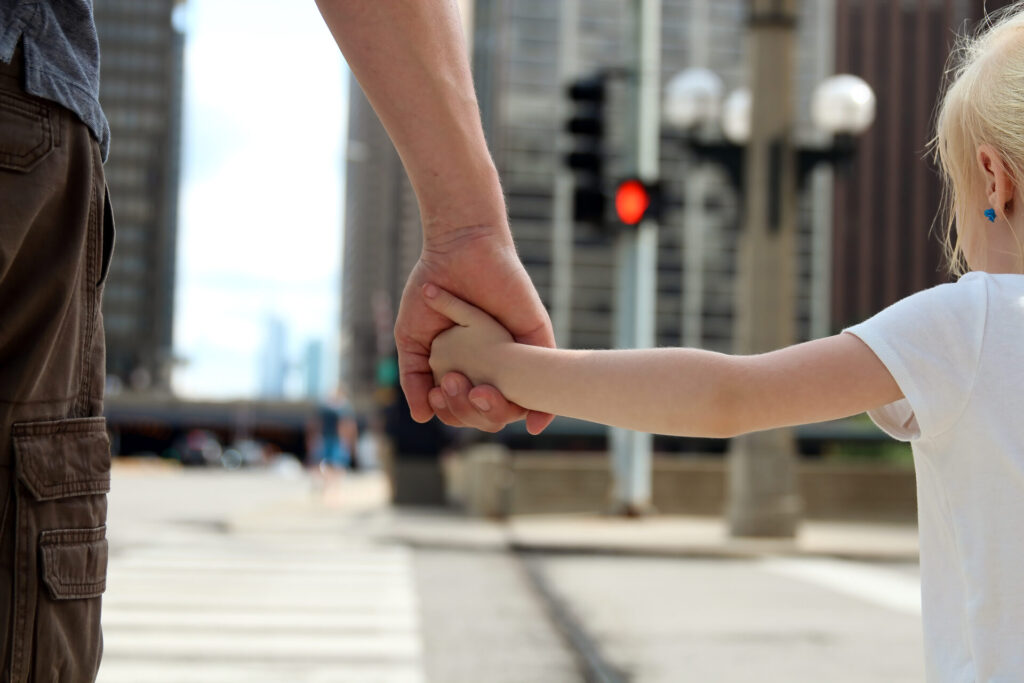Behavior and discipline are very common topics of debate among parents. There are a number of techniques and methods that parents can choose from implementing discipline in their homes, however, the two most gentle and Montessori-aligned methods are known as logical consequences and natural consequences.
In this article, you will learn what both logical and natural consequences are, get some examples of both, and learn the fundamental difference between the two.
You will also find out how, or if, each of these types of consequences works well for Montessori classrooms and homes.
Consequences vs punishments
To better understand both natural and logical consequences, it is important to differentiate them from punishments.
Punishments involve adult-imposed sanctions that are typically not related to the behavior for which a child is being disciplined.
Spanking a child or taking away a toy when the child has gotten into your make-up would be an example of punishment.
The child only learns they will be punished for a certain behavior, so they avoid that behavior out of fear.
Avoiding doing something out of the fear that an unrelated consequence will be imposed upon you is neither natural nor logical.
Punishments can be an effective short-term solution to a behavior, but they do nothing to help the reasoning and problem-solving skills a child will need to consistently make good decisions throughout their lives.
Punishments, such as spanking, have also shown long-term damaging effects.

What are natural consequences?
Natural consequences are the results of our actions that happen naturally and without intervention.
With natural consequences, parents and caregivers do not need to step in and impose themselves on the situation.
When natural consequences are able to happen, children learn important life skills without anyone's help or insistence.
Everything might sound well and good up to this point, but it's important to note that not all natural consequences are positive.
In fact, there are many circumstances (maybe even multiple events in a single day) wherein we simply cannot allow a child to experience the natural consequences of their choices.
When letting a child experience the natural consequence of their choice will interfere with the rights of others or negatively impact the child's health or safety, logical consequences should be applied.

Examples of natural consequences
- Sarah hits her brother, Thomas, while playing with their toys. Thomas no longer wants to play with her and he takes his toy into another room.
- Jonathan has thrown his favorite teddy bear into his sister's bathwater just before bedtime. The bear is wet and he cannot take it to bed with him.

What are logical consequences?
Logical consequences are sometimes confused with punishments. The difference, though, is that logical consequences make sense in relation to the behavior, whereas punishments often do not.
Examples of logical consequences
There are 3 types of logical consequences:
Loss of privilege
- Jill is working with the Pink Tower in her classroom. She begins to throw the blocks instead of stacking them. The teacher helps her gather the material and return it to its place in the classroom until she is able to be respectful of the material.
- Mauricio enjoys walking with his mother without holding her hand. He usually does well and listens to her safety instructions. On this day, he missed his nap and is running into the street instead of walking next to her. She instructs him that now he must hold her hand or sit in a stroller for the remainder of the walk.

Removal from a situation
- Terrence is playing a board game with his siblings. He gets upset that it is not his turn and starts screaming at them. Terrence's father removes him from the room for a time-in in a quieter area.
- Patricia is cutting in line at the playground slide. She has been instructed multiple times to wait her turn and redirected to another activity, but she returns to the behavior, this time aggressively. Her babysitter escorts her to the car to go home.
Solve the problem
- Jillian pushes another child down on the playground. Jillian's grandmother prompts her to help the other child to her feet and make sure she is okay.
- Thomas purposely throws his drinking glass to the floor and it shatters. His father helps him put his shoes on and guides him on how to clean up and dispose of the shattered glass safely.

The difference between natural and logical consequences: a simple explanation and a note on Montessori
Both natural and logical consequences teach kids that actions have consequences and that they are capable of figuring out solutions to their missteps.
The key difference between natural and logical consequences is whether adult intervention is involved.
In Montessori classrooms and homes, both natural and logical consequences are utilized.
Montessori relies heavily on the prepared environment and activities of Practical Life to promote self-confidence, self-reliance, and self-disciplined children.
These attributes can limit the need for excessive consequences. In Montessori, when natural consequences are unsafe or unkind, logical consequences are implemented.
“To let the child do as he likes when he has not yet developed any powers of control is to betray the idea of freedom.”
Maria Montessori, The Absorbent Mind
Do natural and logical consequences align with your parenting style? Do they work well in your classroom?
Cheers and don't forget to subscribe!

It was helpful to me to have this reminder of the difference between natural and logical consequences. I typically shy away from natural consequences because of my fear of injuries, but you are correct some experiences may be beneficial.
Good explanation of them. I love when there is a suitable natural consequence. My son refused to put his shoes on and then when he walked outside the ground was hot and hurt his feet so guess what? He came and put his shoes on.
you know what you forgot? Children really don’t have such rational capacity to make such cause and effect connections. they depend on parents completely and look to parents reaction first. its not at all harmful to be the reason children don’t do something. in fact, its the most natural. punishments are definitely not harmful unless they are in the actual realm of child abuse. Montessori is all well and good but self actualization should not come at the expense of actual, relevant instruction
There are several children in my daughter’s Montessori classroom who are hitting and behaving aggressively. I have noticed that she is also becoming more physical at home. Her teachers don’t seem to be taking action and/ or not noticing what is happening. Yesterday my daughter came home with a bruise beside her eye because a student punched her. She said that this student is still her friend. What am I supposed to do in this situation? I love when children can work things out on their own, but I also want my daughter to be safe in her classroom.
At this point, I would request a meeting with the teacher and the administrator. Ask about their policy on discipline, specifically how they handle physical aggression among students.
An incident report should have been written up, you should have been notified, and the teacher should have put an action plan into place to prevent further occurrences. If this is happening frequently and the teacher isn’t noticing, there’s a supervision issue in the classroom.
Montessori allows natural consequences to take place, but allowing children to “work things out on their own” when it comes to physical aggression should not be happening in a Montessori classroom – or any classroom.